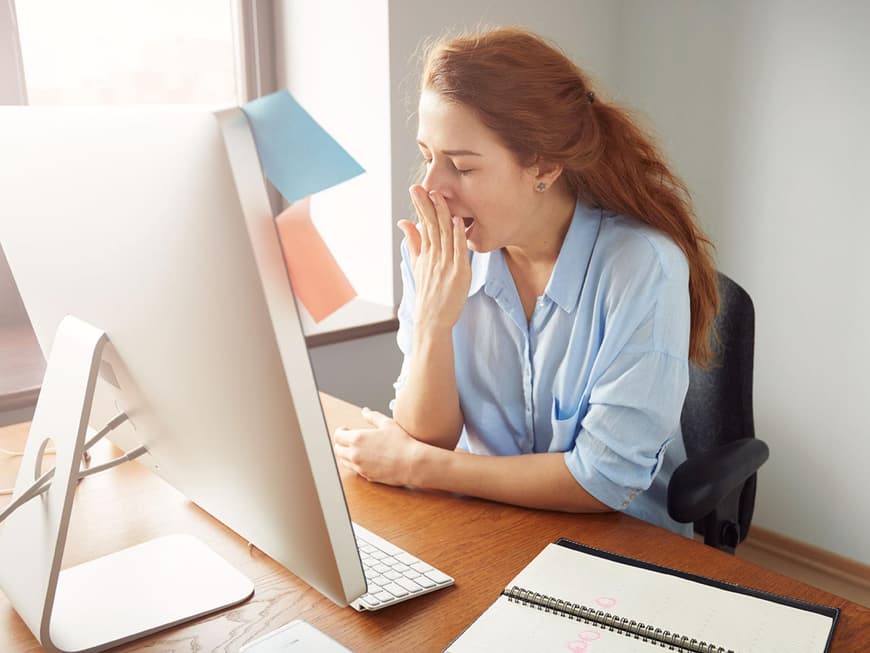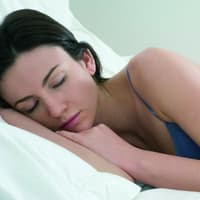
Why are you often tired?
Basically, tiredness is a protective mechanism that protects the mind and body from overexertion. If we feel tired, this indicates that our body is suffering from a lack of sleep, exercise, oxygen or fluids or that our immune system is being mobilized against germs. This makes us feel listless and weak, more inattentive and even more sensitive to pain and more easily irritable. If nothing else works, the only thing that helps is sleep, because this is when the body regenerates and gathers strength. You should sleep between seven and nine hours every night. However, even with sufficient sleep, many people still feel tired and suffer from so-called daytime sleepiness. This not only makes everyday life more difficult, but can also be dangerous.
Causes and treatment options
Persistent tiredness can have many causes that are not automatically linked to a lack of sleep. There are both physical and psychological factors that you should identify in order to combat this.
For example, if you suffer from an iron deficiency, this can lead to chronic anaemia. This means that the red blood cells do not transport enough oxygen to the cells, resulting in tiredness and difficulty concentrating and weakening the immune system. According to the German Medical Association, every second woman is affected. To prevent iron deficiency, you should make sure you get enough iron from your diet. Suppliers of iron include meat, bread and pulses. A lack of vitamin B12 can also lead to anaemia, the most common symptoms of which are tiredness, poor concentration and pale skin. The vitamin is found particularly in animal products such as cheese, eggs and salmon.
If you spend most of the day sitting or lying down, this can also cause fatigue. A vicious circle: as we want to move even less when we are already tired. Sufficient exercise and sporting activities are therefore recommended. Researchers have found that drinking too little not only robs us of energy, but also impairs our sleep. So make sure you drink the one and a half to two liters of fluids per day recommended by the German Medical Association.
Many people resort to antihistamines to combat allergic symptoms. In addition to their actual effect, however, these medications also make you tired, which is why it is recommended that you only take them in the evening. Speaking of the evening, we often do not get enough sunlight during the darker months. However, this is important for reducing the production of the sleep hormone melatonin. So go outside regularly. You should spend thirty minutes a day outside.
If none of this helps, you can try to recharge your batteries with a good old afternoon nap. A cold shower in the morning can also give you more energy, as it has a refreshing effect on your circulation.
When you should contact a doctor
If you have already tried a number of things but there is still no improvement in sight, you should consult your GP. Fatigue can be a symptom of the following diseases:
- Thyroid dysfunction: the thyroid gland secretes hormones that regulate the metabolism. If it is underactive, the body receives too little of the hormones thyroxine and triiodothyronine. This lowers your pulse rate, which also makes you tired. Hyperthyroidism can also have a tiring effect, as the cells consume an unnecessarily large amount of oxygen. A doctor measures your concentration of thyroid hormones with a blood test and can then determine whether you have a condition.
- Diabetes: The hormone insulin helps you to convert sugar from the blood into energy. In diabetes, however, this process is disrupted and can also make you tired. Here too, a blood test can provide more information.
- Depression and other psychological causes: A side effect of depression is a pronounced lack of drive that makes you want to just crawl into bed. If you suffer from a persistent, very cloudy mood, feel empty and cannot sleep because of many thoughts, it is advisable to seek psychological help.
- Sleep apnoea: This refers to breathing interruptions during sleep. These are caused by slackening of the throat muscles and lead to waking up or the start of certain bodily functions. A sign that you suffer from this could be a dry mouth as well as headaches and dizziness after getting up.
- Infectious diseases: Infectious diseases are caused by pathogens and weaken the body. Diseases such as influenza, glandular fever, pneumonia, but also malaria and AIDS have these symptoms.
- Cancer: Most types of cancer are associated with fatigue and weakness. This can be due to the symptoms but also to the treatment, such as chemotherapy.
You may also be interested in this:
Iron deficiency and its symptoms: Tired all the time?
Burnout syndrome: Is my tiredness already an illness?
Depression: A certain diet can help
Bye-bye tiredness: more energy in everyday life
Energy for the body: more drive through deacidification





